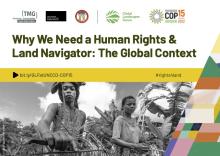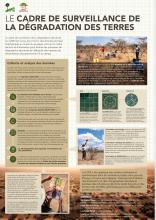Land Library Search
Through our robust search engine, you can search for any item of the over 73,000 highly curated resources in the Land Library.
If you would like to find an overview of what is possible, feel free to peruse the Search Guide.
/ library resources
Showing items 55 through 63 of 405.TMG Research is working with the governments of Benin, Kenya, Madagascar, and Malawi to advance the implementation of the UNCCD Land Tenure Decision 26/
Un document d'options pour sensibiliser à la gouvernance foncière responsable pour lutter contre la désertification, la dégradation des terres et la sécheresse.
Recommandations pour les facilitateur.rice.s des champs-écoles, concepteur.rice.s et responsables de projet de développement agricole
Le champ-école est une démarche participative de formation et de conseil, basée sur l’expérimentation collective de systèmes de culture innovants.
An options paper for raising awareness on responsible land governance for combatting desertification, land degradation, and drought.
La présente étude constitue une synthèse des données qualitatives et quantitatives des impacts de l’accord de partenariat volontaire (APV) UE-FLEGT dans sept pays : le Cameroun, le Ghana, l’Indonésie, la République du Congo, la Côte d’Ivoire, le Guyana et le Honduras.
Le cadre de surveillance de la dégradation des terres (ou LDSF) est conçu pour fournir des données de base biophysiques au niveau du paysage, ainsi qu’un cadre de suivi et d’évaluation pour évaluer les processus de dégradation des terres et l’efficacité des mesures de réhabilitation (récupération
This report presents a full Country Assessment of land governance in Liberia carried out with the Global Land Governance Index (LANDex).
Produced jointly by the secretariats of the Food and Agriculture Organization of the United Nations (FAO) and the United Nations Convention to Combat Desertification (UNCCD), with contributions from multiple stakeholders, this technical guide addresses the integration of the Voluntary Guidelines
Land degradation neutrality (LDN) has been defined by the Parties to the Convention as: A state whereby the amount and quality of land resources, necessary to support ecosystem functions and services and enhance food security, remains stable or increases within specified temporal and spatial scal








